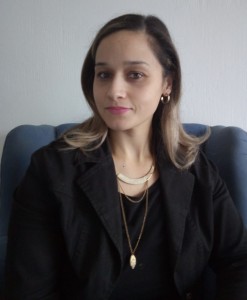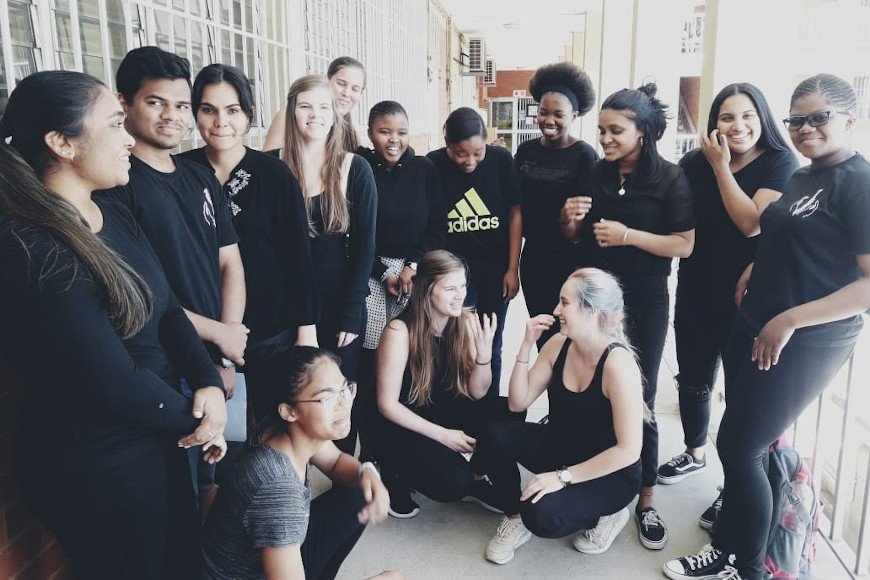The Durban University of Technology’s (DUT’s) Dr Cleo Prince is passionate about teaching and learning, clinical supervision, research and now Collaborative Online International Learning (COIL). COIL was founded in 2006 by the State University of New York Professor Jon Rubin, as a model for fostering cross-cultural student competence through the development of multicultural learning environments that link University or college classes in different countries online.
 Dr Prince has been involved in lecturing at DUT since 2016 when she was employed as a part-time lecturer. In 2018, she was appointed as a permanent lecturer within the Department of Chiropractic and has enjoyed fulfilling this role for the past two years. Within the department, she is involved in the ambits of teaching and learning, clinical supervision, research and now COIL.
Dr Prince has been involved in lecturing at DUT since 2016 when she was employed as a part-time lecturer. In 2018, she was appointed as a permanent lecturer within the Department of Chiropractic and has enjoyed fulfilling this role for the past two years. Within the department, she is involved in the ambits of teaching and learning, clinical supervision, research and now COIL.
“I have always been interested in unique modes of content delivery and when the concept of COIL was introduced to me, I was hooked! I attended a few COIL workshops with Dr Penny Orton and Lesley Cooke from IEP, under the guidance of Dr Lavern Samuels. At the beginning of this year, I was identified as a candidate to take part in the iKudu COIL project which is a project amongst a consortium of 10 universities,” she said.
Dr Prince further said that the aim of the iKudu project is to create a platform to establish virtual exchanges and provide training to academics participating in them. “One can set up a project outside of iKudu but iKudu was a particular opportunity that was available, but there are other opportunities with COIL with many different universities around the globe,” she added.
Dr Prince spoke more on her COIL project, saying that she has established a partnership with Caroline Wensink from the Amsterdam University of Applied Sciences involving Sport and Event Marketing students, under the guidance of Eva Haug, a COIL coordinator and colleague of Caroline from the Amsterdam University of Applied Sciences.
She stressed that in discussions about what type of project DUT would like to undertake, it was found that a lot of South African and Dutch students did not know a lot about cultural aspects within their own diverse countries. “This presented a unique opportunity for students to get to know aspects of cultures within their own country and in a different country (i.e. for South African students, they were able to learn about Dutch culture in addition to learning about different cultures within South Africa),” she said.
Dr Prince felt that this would be appropriate for chiropractic students as they needed to be culturally knowledgeable and sensitive when managing patients in practice. She indicated that there are 22 chiropractic students from DUT and 25 Sport Marketing students from UAS in Amsterdam, involved in this COIL project.
Speaking about the importance of COIL projects at universities, Dr Prince said that globally, participating in a COIL project is one of the key actions that may help students become global graduates and may provide students with the opportunity to interact, engage and collaborate with peers they would have not otherwise had the chance to work with. “Share understanding of one another’s societies, ways of living, and perspectives to develop valuable intercultural skills and mutual understanding. Experience, interact and gain insight into cultural differences in human relationships, behaviour and communication that are relevant to their discipline; enhancing their ability to effectively manage and appropriately respond to diverse opinions, beliefs and values that might be different to their own. Develop digital skills that are key to life as we are in the 4th Industrial Revolution, especially those that will enable them to participate in team-work involving networks of geographically-dispersed professionals,” she stressed.
However, Dr Prince said that being in the midst of COVID-19 did not deter them from continuing their project. Initially, she had Zoom meetings with her COIL coaches, to help with the conceptualisation of the project. “The coaches gave us such great ideas for ice breakers amongst the students and how to carry out the project. The coaching has really been valuable as the coaches are very approachable and check in with our progress from time to time which helps to keep one on track,” she said.
Dr Prince further added that on WhatsApp, they divided the students into teams to monitor the collaboration and interaction taking place for each of the tasks. “I think this project has done well to be implemented at this time as the students are appreciating the interaction they are having with classmates and their Dutch peers,” she said.
Dr Prince said that this is her first COIL project and that she was really nervous to undertake it. “I was concerned about how the students may react to be involved in a project like this and access to data amongst the students was also a real concern. We proposed that the project be facilitated and completed on WhatsApp as it is a data light platform,” she said.
She stressed that the students rose to the occasion and have enjoyed participating and interacting with their Dutch peers over WhatsApp, most of them going over and above the requirement for the tasks that were being undertaken. “It really warms my heart to see how the students have been engaging in the project,” she said.
Dr Prince added that such COIL project has great beneficial value to both the staff and students at DUT. She said that collaborations can be set up with COIL partner Universities which may present research opportunities for the staff and postgraduate students.
“COIL is a form of project-based learning and lends itself to a student-centred approach to teaching and learning, and students are encouraged to be independent, lifelong learners. In a South African context, and especially at DUT, we are looking to decolonise and internationalise our curriculums and I feel COIL projects is a mechanism that can be done to achieve this,” she added.
In terms of her future goals for her project, Dr Prince hopes to continue this annually with a new cohort of students each year, adapting the project to suit the needs and personalities of the students. “Long term, I would like to be involved in an exchange programme with a COIL university where DUT students can spend a semester at a partner university and vice versa,” she stressed.
Pictured: DUT Chiropractic students involved in the COIL Project.
Pictured: Dr Cleo Prince
-Waheeda Peters


